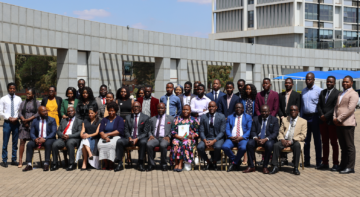Blogs

Kenya’s Senate and County Assemblies hosted the 2nd Legislative Summit from 20th to 23rd March 2017. I had an opportunity to speak at this forum as part of a panel themed « Evidence-Based Law-Making in the Legislature: Challenges and Opportunities for Effective and Efficient Law Making Processes. » Other panelists included Dr. Johnson Okello, Acting Director at Legal Services at the Senate, and Mr. Edward Libendi, Clerk of the Makueni County Assembly.
Key challenges with evidence use highlighted during the session include weak capacity in law making and evidence utilisation, lacking county-level data for county-level decision-making, poor relations between the county governments and county assemblies, and lack of implementation of laws.
Weak capacity in law making and evidence utilisation remains a key barrier
Conversations at this session kept coming back to the challenge of weak capacity in law making, conducting legislative research, and effective utilisation of evidence. At national level, the main capacity issue is in relation to legislative research and evidence utilisation. Dr. Okello decried the weak capacity in legislative research at the national level as one of the barriers to evidence use. He argued that many of the existing staff lack the requisite capacity to conduct legislative research in order to provide the evidence needed by members of parliament or parliamentary committees. At the county level, Mr. Libendi observed that there is a huge capacity gap in knowledge and skills in law making among members of county assemblies (MCAs) and this has meant that many Bills are being drafted by county assembly staff because MCAs have no capacity to prepare these. The staff lack capacity on conducting legislative research and in evidence use generally, and this affects the quality of Bills written. At institutional level, he noted that county assemblies lack information resource centres to support evidence use; in fact, he said he only knows of three county assemblies that have information resource centres out of the 47 county assemblies. All these challenges curtail evidence use in the decisions and/or Bills passed both by national and county assemblies.
Lacking county-specific data for decision-making by county assemblies
Another challenge raised during this session was the lack of county-specific data. Mr. Libendi noted that government data and research institutions such as the Kenya National Bureau of Statistics (KNBS), the Kenya Public Policy Research and Analysis (KIPPRA) among others are not devolved, and so they still generate data only for national decision-making. Yet counties require county specific data to inform their decision-making, but these data are lacking. This issue challenges the data and research institutions to revisit their strategies and mechanisms to respond to evidence needs of counties in order to improve decision-making at these levels. This is especially critical given the importance of the decisions being made by county governments and county assemblies, and their implications for service provision to Kenyans.
Poor relations between the county governments and county assemblies resulting in poor and unnecessary laws
The persisting poor relations between county governments and county assemblies are having adverse effects on the effectiveness of law making and the subsequent use of evidence in law making processes. It was observed that in many counties, county assemblies are making laws « to fight’ governors and county governments and not laws needed to spur development. As such, many of these laws are not being assented to by governors and in most cases, are not being implemented. It is also the case that because of these poor relations many county governments may not be providing data and information on their implementation efforts to enable the county assemblies to conduct oversight.
Non-implementation of laws limits opportunities for evidence use
In one way, it may be the case that the laws being made by counties are not really needed as they are made to ‘fight’ county governments, so why should county governments assent to and implement such laws? More importantly, county governments are supposed to review and contribute to the Bills even before they are passed in parliament, but because of the bad relations, whenever Bills are sent to governments they do not comment or input into these. Ideally, Bills should be made out of policies prepared by the executive (government), rather than policies being made out of Bills. So then the question is if there are lacking policies, should county assemblies go ahead to develop Bills that will not be implemented or should they find other ways of requiring governments to develop policies from which Bills can be derived?
One of the participants concluded that county assemblies are simply « oversighting non-implementation’ because the laws they are passing are not being implemented by county governments.
If laws are not being implemented, then it means that there are no opportunities for evidence use in implementing and monitoring implementation of laws. This also means that there is limited opportunity for county assemblies to conduct oversight.
These conversations and my reflections provide useful insights for informing efforts aimed at enabling the utilisation of evidence in legislative processes in Kenya. It is important to note that county assemblies are making very important development decisions including resource allocation in Kenya. For this reason, urgent investments to enable better and increased use of evidence at county level legislative processes are needed.
Related Posts





